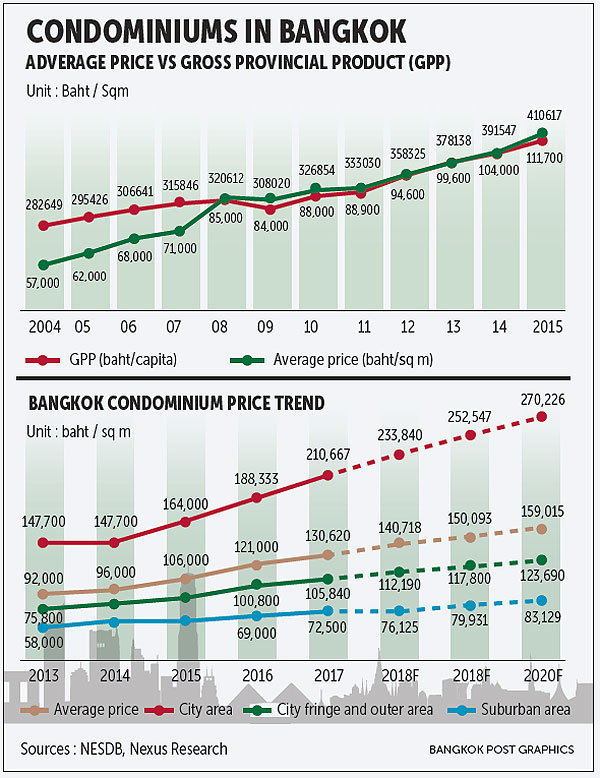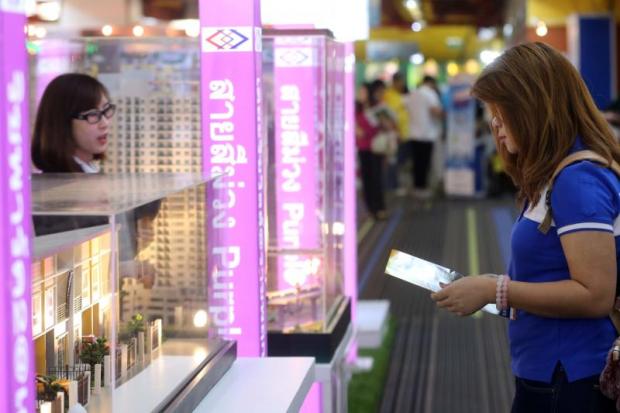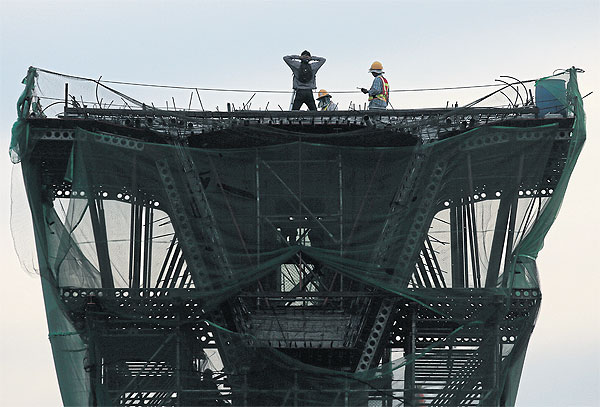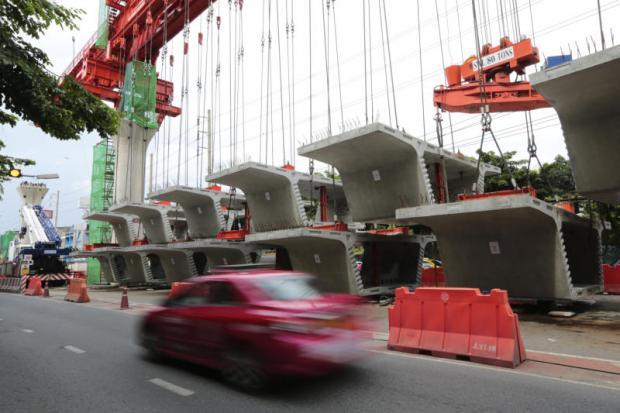Thailand: Good fortunes forecast for 2018
Thailand’s property market prospects are expected to be bright next year based on the country’s economic expansion, government spending on big-ticket infrastructure projects and the rise of the Eastern Economic Corridor (EEC).
Surachet Kongcheep, a property analyst, says market growth will mirror the country’s positive economic trajectory. Key factors boosting the economy are spending on the EEC and mass transit line expansion.
SET-listed contractor Ch.Karnchang Plc said new infrastructure projects that the government plans to open for bidding next year include the southern Purple Line from Tao Poon to Rat Burana — the largest one at 130 billion baht.

Other rail projects include the extension of the Blue Line from Bang Khae to Phutthamonthon Sai 4, worth 21.2 billion baht; the Orange Line from Thailand Cultural Centre to Taling Chan, worth 85 billion; and two extensions of the Green Line from Samut Prakan to Bang Pu and Ku Kot to Lam Luk Ka.
Nalinrat Chareonsuphong, managing director of property consultant Nexus Property Marketing Co, says GDP growth, which the government projects at 4% during 2017-20, will reflect overall expansion in each business sector.
But there are some challenges in the property sector, including development of neighbouring countries like Cambodia, Laos, Vietnam and Myanmar, which will shift foreign investors’ interest from Thailand.
Kromchet Vipanpong, chief executive of property developer Asset Wise Co, says the property market will be boosted by economic growth, driven by healthy exports and a more positive political landscape.
“Banks’ rejection rates will likely drop because some homebuyers who have been blacklisted by credit bureaus over the past two years won’t generate new debt and will be able to clear their records next year.”
Suwannee Wattanavekin, executive vice-president of Kiatnakin Bank Plc’s asset management department, says the property market in 2018 will continue to be dominated by large developers with their stronger financial status.
“Large developers shifted to the upper-end residential segment, where purchasing power was stronger than in the lower-end market,” she says. “They also have opportunities to partner with foreign investors, which can help boost their competence.”
She says small and medium-sized developers will be subdued next year because most of their products are in the middle- to lower-end segment or units priced lower than 3 million baht, which have seen a slowdown.
Suphin Mechuchep, managing director of property consultant JLL Thailand, says there are no new factors, in general, that will create significant changes or impact the property market next year.
“Land prices will remain a key challenge that developers need to cope with, as they are a significant cost for property development,” she says. “Bangkok land prices tend to rise, particularly plots in prime locations. A new-high record price per square wah will definitely be reached next year.”
Mrs Suphin says the land and buildings tax will be a wild card affecting the property sector in 2018. If an effective date for the tax becomes clearer, it will push some landowners whose plots have high value to offer them for sale or lease.
“This will provide an opportunity for developers to buy or rent plots in feasible locations more easily,” she says. “But prices of land in prime locations will not be lowered, due to strong demand among developers.”

A saleswoman provides details of a condo project to a potential customer.
Condominium sector
Mrs Nalinrat of Nexus says average condo prices in Bangkok have been healthy since 2015, when price growth for the first time outstripped Bangkok’s gross provincial product (GPP).
“Land price is a key factor boosting condo prices,” she says. “With limited land supply on main roads and higher land prices, condo development next year will tend to entail low-rise buildings in small sois.”
She says the super-luxury and luxury condo segments will keep attracting large and new developers, while prices will continue rising. More buyers will come from abroad, on top of those looking to invest in a second home.
Foreigners are not only becoming buyers, but also investment partners. With investment partners from overseas, condo projects can also build confidence among buyers.
In the high-end segment, the majority of developers will remain large firms that have the financial resources to buy land plots near mass transit lines in the inner city.
In the medium-end condo market, projects will remain in downtown locations and near mass transit lines. This market is where most buyers have stable income and really need a residential unit.
“Developers should make products to match the lifestyles of target customers in this segment,” Mrs Nalinrat says. “For the lower-end market, as price remains a key factor, developers should manage costs to make prices affordable.”
They should also consider customers’ payment ability, with banks offering monthly instalments that affect buyers’ finances as little as possible.
“Land price is a significant development cost that has an impact on selling prices of middle- to lower-end condos, where buyers can afford unit prices of no higher than 2 million baht or 70,000 baht per square metre,” Mrs Nalinrat says.
Office sector
Among all property categories, the Bangkok office sector will have the best trend in 2018, as existing supply cannot support strong demand, says Mrs Suphin of JLL.
“The office market’s overall vacancy rate is only 9% this year, while office rents have risen every year over the past seven years and will continue to increase,” she says.
Some Grade A+ office towers were able to achieve a rental rate of 1,300 baht per sq m per month for large spaces bigger than 1,000 sq m. This rate was a new record high, as most Grade A office towers offered rentals rates lower than 1,000 baht per sq m per month for large tenants.
In 2018, all Grade A office towers in prime locations will gradually raise rental rates to higher than 1,000 baht per sq m per month.
Companies that want to rent a small-scale office space in a Grade A+ office tower in the central business district will likely spend 1,300-1,500 baht per sq m per month.
“A healthy office sector market stimulates developers to build more office towers, while demand is expected to grow to absorb the new supply,” Mrs Suphin says. “Old office buildings should renovate and improve to maintain their competence.”
Mr Surachet, the property analyst, says new office supply that is under construction and scheduled for completion during 2018-21 totals 633,560 sq m.
“The large amount of new office supply to be added in the future will likely have an impact on the overall office market in Bangkok, particularly old office buildings located next to new ones,” he says.
Among the new supply in the central business district will be 548 Ploenchit, a new office tower on Phloenchit Road, located opposite luxury mall Central Embassy. That project is being handled by SET-listed developer Raimon Land Plc at a cost of 5.3 billion baht.
Others will include T One, a 34-storey office tower with a lettable area of 22,500 sq m on Sukhumvit Soi 40. That project is being undertaken by Tan Ing Asset Co, owned by green-tea tycoon Tan Passakornnatee.
There will also be two office towers with a combined lettable area of 70,000 sq m at Whizdom 101, a mixed-use project near Sukhumvit Soi 101/1 being developed by Magnolia Quality Development Corporation Ltd, owned by the Chearavanont family.
The largest new supply will be from One Bangkok, a 120-billion-baht mixed-use project at Wireless-Rama IV Road, being headed by Charoen Sirivadhanabhakdi’s TCC Group. This project alone will add 500,000 sq m of office space.

Construction of the Green Line (North) route at Vibhavadi Rangsit Road.
Retail
Mrs Suphin of JLL says retail in 2018 will have limited growth as large developers like Central Group and The Mall Group focus on renovating their existing shopping centres rather than developing new ones.
At the same time, Bangkok’s discount store market is saturated, with big players like Tesco Lotus and Big C having expanded across Bangkok. These established companies will also focus on opening small-scale retail centres.
Community malls, a segment that had fast expansion rates in Bangkok over the past decade, have started to lose steam after many players failed, Mrs Suphin says.
“Those interested in new community mall development were thus reluctant to invest,” she says. “But expansion will be possible if developers understand the requirements of both retail entrepreneurs and their target customers.”
Hotels
The hotel sector has been active this year in terms of investment and the number of transactions. In the first three quarters, hotel transaction volume totalled 11.2 billion baht, the highest since 2014, Mrs Suphin says.
In 2018, hotel investment will see a positive trend as investors remain interested in acquiring them. The ability to turn a profit will remain a key factor prompting hotel owners to sell their assets.
With great interest from investors, hotel owners are expecting higher prices, particularly from quality and attractive hotels. This will be a new challenge in hotel investment next year, Mrs Suphin says.
Source: https://www.bangkokpost.com/business/news/1385178/good-fortunes-forecast-for-2018


 English
English




